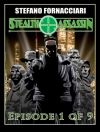He hadn’t died from burns or asphyxiation. His skull had been smashed in. And not simply from a fall.
The good employer: yes, on the face of it, a fair description of Leonard Woode. Elderly, of independent means, cultured, considerate, his servants in his home would certainly endorse this view. Ludovic Travers struck up a chance acquaintanceship with Woode at an auction of valuable paintings, and when the old gentleman was taken ill, accompanied him home. This led to a small assignment for Travers, as Woode was anxious to trace the whereabouts of a certain French family. The whole reason for the commission was shrouded in mystery and on its conclusion Woode sent a retainer to Travers to cover possible future errands. Having this in view Travers continued with his investigations after the old man’s death Many questions remained unanswered which intrigued not only the detective, but also his old friend, Inspector Jewle. Who was the mysterious nurse? Was Freeman really the old man’s nephew and if so how had he been located so fortuitously? How did Dr. Hitchman fit into the scheme? Travers gradually untangled the web and answered these questions and many unsuspected others.
The Case of the Good Employer was originally published in 1966. This new edition features an introduction by crime fiction historian Curtis Evans.
Über den Autor
Christopher Bush was born Charlie Christmas Bush in Norfolk in 1885. His father was a farm labourer and his mother a milliner. In the early years of his childhood he lived with his aunt and uncle in London before returning to Norfolk aged seven, later winning a scholarship to Thetford Grammar School.As an adult, Bush worked as a schoolmaster for 27 years, pausing only to fight in World War One, until retiring aged 46 in 193I to be a full-time novelist. His first novel featuring the eccentric Ludovic Travers was published in 1926, and was followed by 62 additional Travers mysteries. These are all to be republished by Dean Street Press.Christopher Bush fought again in World War Two, and was elected a member of the prestigious Detection Club. He died in 1973.












